
John Philip Sousa was an American composer and conductor of the late Romantic era known primarily for American military marches. He is known as "The March King" or the "American March King", to distinguish him from his British counterpart Kenneth J. Alford. Among his best-known marches are "The Stars and Stripes Forever", "Semper Fidelis", "The Liberty Bell", "The Thunderer", and "The Washington Post".

The World's Columbian Exposition was a world's fair held in Chicago in 1893 to celebrate the 400th anniversary of Christopher Columbus's arrival in the New World in 1492. The centerpiece of the Fair, held in Jackson Park, was a large water pool representing the voyage Columbus took to the New World. Chicago had won the right to host the fair over several other cities, including New York City, Washington, D.C., and St. Louis. The exposition was an influential social and cultural event and had a profound effect on American architecture, the arts, American industrial optimism, and Chicago's image.

William Christopher Handy was an American composer and musician who referred to himself as the Father of the Blues. Handy was one of the most influential songwriters in the United States. One of many musicians who played the distinctively American blues music, Handy did not create the blues genre but was the first to publish music in the blues form, thereby taking the blues from a regional music style with a limited audience to a new level of popularity.

Horatio William Parker was an American composer, organist and teacher. He was a central figure in musical life in New Haven, Connecticut in the late 19th century, and is best remembered as the undergraduate teacher of Charles Ives while the composer attended Yale University.
"Illinois" is the regional anthem of the U.S. state of Illinois. Written in the early 1890s by Civil War veteran Charles H. Chamberlain, the verses were set to the tune of "Baby Mine," a popular song composed in 1870 by Archibald Johnston. "Illinois" became the state song by an act of the 54th Illinois General Assembly in 1925.

"On the Banks of the Wabash, Far Away" was among the best-selling songs of the 19th century, earning over $100,000 from sheet-music revenues. Written and composed by American songwriter Paul Dresser, it was published by the Tin Pan Alley firm of Howley, Haviland and Company in October 1897. The lyrics of the ballad reminisce about life near Dresser's childhood home by the Wabash River in Indiana, United States. The song remained popular for decades, and the Indiana General Assembly adopted it as the official state song on March 14, 1913. The song was the basis for a 1923 film of the same title. Its longtime popularity led to the emergence of several lyrical versions, including an 1898 anti-war song and a Swedish version that was a number-one hit.

Bela Lyon Pratt was an American sculptor from Connecticut.

The Marching Illini (MI) is the marching band of the University of Illinois Urbana-Champaign. The Marching Illini is an organization which annually includes approximately 400 students enrolled in the University of Illinois. Part of the College of Fine and Applied Arts and Illini Athletics, the Marching Illini represent virtually every college, discipline, and major on the university's diverse Urbana-Champaign campus.
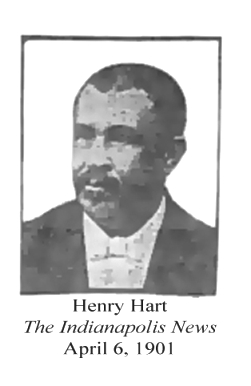
Henry Hart (1839–1915) was an American composer, singer, and violinist. He led the Henry Hart Minstrels, was proclaimed a "social necessity" in Indianapolis, Indiana, and was the leader of a family musical group that Emma Lou Thornbrough called "the best-known group of colored entertainers in the state."
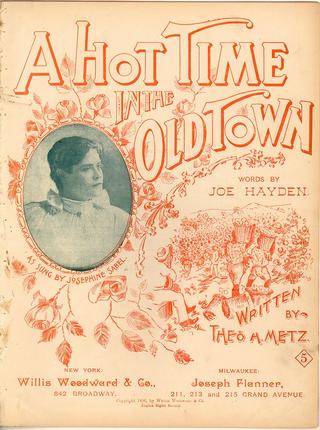
"A Hot Time in the Old Town", also titled as "There’ll Be a Hot Time in the Old Town Tonight", is an American popular song, copyrighted and perhaps composed in 1896 by Theodore August Metz with lyrics by Joe Hayden. Metz was the band leader of the McIntyre and Heath Minstrels.
Joseph Taylor Jordan was an American pianist, composer, real estate investor, and music publisher.
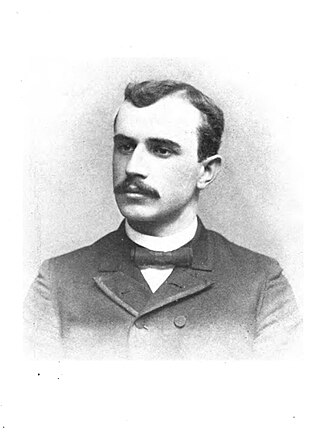
Roland Forrest Seitz (1867–1946) was an American composer, bandmaster, and music publisher. For his many march compositions he earned the sobriquet “The Parade Music Prince”.

William Paris Chambers was an American composer, cornet soloist, and bandmaster of the late 19th century.
Nathaniel Clark Smith was an important African-American musician, composer, and music educator in the United States during the early decades of the 1900s. Born on the Army base at Fort Leavenworth, Kansas, Smith began his music education very early organizing bands in Wichita starting in 1893. His strict military style leadership led to prominence and over the next 30 years he would lead bands in Chicago, Wichita, Kansas City, the Tuskegee Institute, and in St. Louis. He was an important educator for many of the prominent early Jazz musicians from Kansas City, Chicago, and St. Louis. He died in 1935 as the result of a stroke. Many primary documents about Smith's life have been lost as a result of a fire that destroyed most of his personal documents.
The Stonewall Brigade Band is a community concert band based in Staunton, Virginia. It is the United States's oldest continuous community band sponsored by local government and funded, in part, by tax monies. Originally a brass band, the band was formed in 1855 as the Mountain Sax Horn Band. It was also called Turner's Silver Cornet Band by 1859, for its first director, A. J. Turner. At the onset of the American Civil War, the band was mustered into the 5th Virginia Infantry Regiment, part of the Stonewall Brigade under Stonewall Jackson.
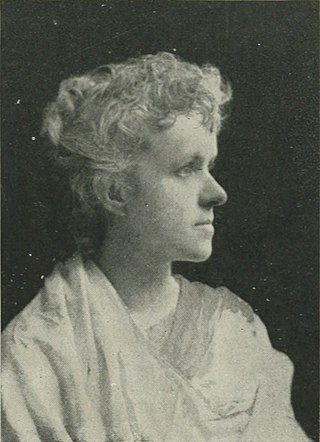
Ellen Rankin Copp, also called Ellen or Helen Houser Rankin, was an American sculptor. Her works were featured at the World's Columbian Exposition in Chicago in 1893.
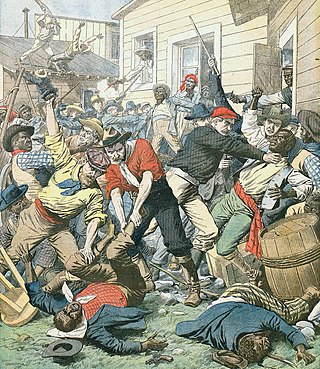
In the early hours of 3 June 1893, a black day-laborer named Samuel J. Bush was forcibly taken from the Macon County, Illinois, jail and lynched. Mr. Bush stood accused of raping Minnie Cameron Vest, a white woman, who lived in the nearby town of Mount Zion.

Zulema Garcia Olsen was an American musician and composer, and represented "Spanish Texan" women at the World's Fair in Chicago in 1893.

Ruth Reese was an African American-Norwegian singer, writer and civil rights activist. She was one of the first prominent black singers in Norway and was actively involved in the international fight against racism. Over several decades, she contributed significantly to the understanding of African American history and music in Norway.
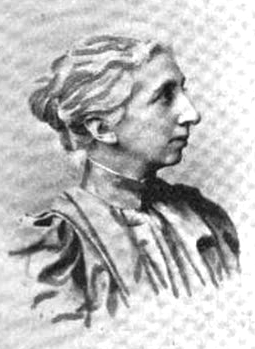
Eliza Mazzucato Young was an Italian-born American composer, musician, and educator. She wrote Mr. Sampson of Omaha (1888), one of the first operas by a woman to be produced in the United States.
















